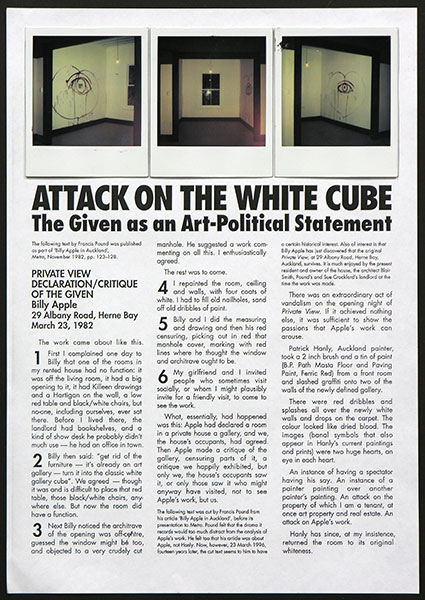Today is the funeral for Francis Pound, a much loved lecturer and figure of the University of Auckland’s art history department and as it stands a producer of some of the country’s finest art historical writings. We will miss Francis and mourn the legacy and potential of his contributions.
I started University in 1992 and entered the art history department at the University of Auckland. It was a fiery year for the discipline as the exhibition Headlands, an overview of modern and contemporary New Zealand art had launched at the Museum of Contemporary Art in Sydney, instigating a series of interconnected debates on nationalism, appropriation and post-colonial critique. I first came into contact with Francis in any meaningful way as a year three student in his paper ‘Nationalist Themes in NZ Art, 1930 to the present’. In many ways the paper was a forum for Francis to test out his thinking in response to the art history of New Zealand as he saw it, in direct relation to the debate. The lectures became something like a test case for the chapters of his book published the following year, The space between: Pakeha use of Maori motifs in modernist New Zealand art.
Francis was already a well-known author and critic, he had completed his doctorate on Killeen and modelled a pathway for a professional interest in New Zealand’s art history. He was opinionated and anecdotal in tutorials – humorous as well as philosophic. He had the rare ability to marry disciplines together, to convert ideas across the line and into his project. He was intellectually flexible in a way that was liberating, one never felt you had to agree with him, but he liked strongly held ideas. As a teacher, he encouraged discussion and feedback from a group of mostly teenagers in a way that never made you feel like he was siphoning your thoughts through the gates of authority and reason, rather turning them over in his mind and reflecting on them. Despite being engaged in heated debates on subjects which he felt intensively about, he wasn’t afraid of controversy, reminding his class of the recent instituted accounts of racism in New Zealand through his photographic archive. Later in his extraordinary paper, ‘Structures in 15th Century Italian Renaissance Art’, he took structuralist and post-structuralist critique to the Renaissance – inviting a close reading on paintings that otherwise remained remote for most students in the South Pacific. He brought his Catholic education to bear on theological concerns with art historical and philosophic ones.
Later in my role at the Auckland Art Gallery I played a small role in hosting an American scholar to New Zealand who had read Francis’ writing by way of introduction to New Zealand art. I couldn’t help thinking what a fascinating and eccentric lens that might be, channelled by highly charged seasons of interest and enquiry. Her remarks were that these were some of the strongest accounts of deployment of philosophic texts in art history she had come across, she was genuinely taken aback, and asked where she could meet the man himself.
Much later, Francis would complete his ambitious tome The Invention of New Zealand: Art & National Identity, 1930–1970 and yet we awaited more, eager to see him complete his thinking on modern painter Gordon Walters which he had long held close to his heart.
There is more to say about his contributions to art history, but for now I would like to honour the art devotee and teacher that was Francis Pound. If I remember back to that class of 1994, those students now have all gone on to make their contributions back to the development and critical growth of art in this country. I am sure he would have been proud of them. I hope he knew how much he gave to this wider field and all its peculiar interests.
